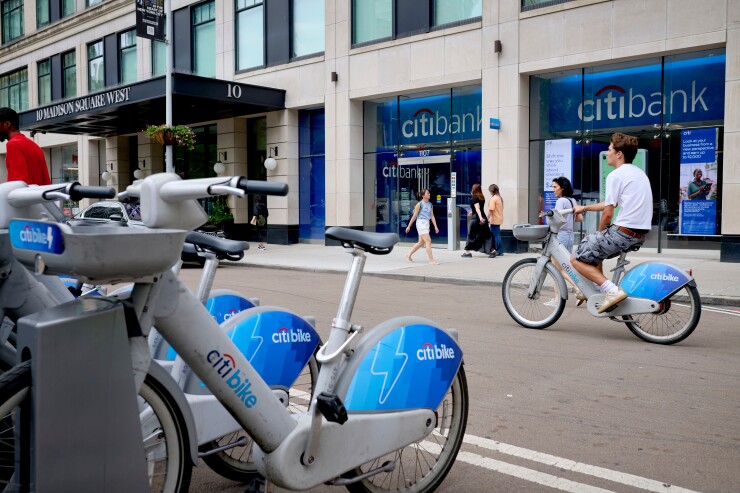
Kate Luft, who's traveled around the globe working for
Last year, the megabank revamped its U.S. retail banking blueprint with the launch of a "simplified banking" plan that reduced the number of customer checking accounts and introduced "relationship tiers" in which customers receive more benefits — such as waived monthly service fees — when they meet certain monthly balance requirements.
Similar to the travel industry,
"I think of it like an airline," Luft told American Banker. "The more you do with us, the more we recognize you, and the more you'll continue to rise among our relationship tiers."
Luft is
Luft took over the retail banking head job when longtime

Despite the fact that Fraser had much more experience when they were working together,
After college, Luft joined
From Latin America, she went to Australia, where she ran
In the latter job, Luft oversaw
"Really what we did was redefine our products and value [propositions]," said Luft, who grew up in New Jersey. "Our mandate was, how do we make it super-simple for our clients?"
In her new role, which does not include
Read more about Citigroup here:
In her first on-the-record media interview since the promotion, Luft talked about
The following Q&A has been edited for length and clarity.
What role do branches play in Citi's post-simplified retail banking business?
When you think about physical locations, I would say we are where we exactly want to be. We're in six core markets. We show up as "one
I thought it was interesting that you said, 'We're exactly where we want to be' in terms of locations. Does Citi have enough branches to compete with JPMorganChase and Bank of America, which have national branch footprints and intend to enter new markets?
I would say the biggest thing is, even when you look at our branch footprint,
The other thing I would say …
Where we're actually really focused on is … 'how do we use our branch staff, who are fantastic, to actually do more outreach?' … calling clients, making sure they're checking in on things like, 'Hey, your CD's expiring. What do you want to do next?' or 'You just got your bonus. How do we help you?' It's a much different conversation.
Any changes to the branch network that you foresee?
We always do the [business as usual] relocations. We have natural lease expirations. But no, no major shifts to our branch count and actually, you're seeing us open up a lot of de novos this year. [Since November,
Any changes in the strategy compared to your predecessor?
So [the transformation] was a big thing that now we're really kind of through. We have the foundations we're focused on. We've just made our product simpler than any of the larger banks. When you think about what the fintechs have and why the fintechs were so competitive in the past, it was because the banks made it too complicated. Like, we all had legacy products and so on, and didn't take the time to actually make that simpler.
I get super-excited about it because it looks so much different than our competitors. As we listen to our clients, they're asking for things like rewards. So, how do we do more rewarding? We just launched debit-card merchant offers. We're seeing an immediate uptick in that because clients are just looking for more from their bank now.
You mentioned fintechs and the fact that some of their success has to do with being simpler than how traditional banks operate. How do you compete with that space?
When I think about the fintechs, we're at par, if not ahead now, with our offering and the simplicity of it.
We have not only the branch network, we also have 65,000 ATMs across the U.S. The fintechs haven't cracked that, and I think that will still be a deterrent for them in the States.
Are you working on any fintech partnerships?
Yeah, we are partnering with fintechs again. … It's not full-value chain integration. It's really specialized value they can help us with, in our rewards. I would say, more to come. But really, we're looking at, How do we sweeten the reward space and give more to our clients?
What was it about the trading floor at Citi that was appealing and why stay with banking?
It was 2008, and every day was different. Everything you were doing was in the news … and on the trading floor, it was a very fascinating time, a scary time as well, but you saw the rebuild of the financial industry. And I think I've stayed with banking for the last 17 years because it's so purposeful. I've stayed on the consumer side because we all need bank accounts, and my goal is to make it easier for our clients and our employees to really be passionate about the client experience. And everything we do, every decision we make, we really focus on that.
I geek out on it a bit because you can see and you can measure the impact in such scale, and you know when you get things wrong, too. So I think that's a fascinating and fulfilling career.





